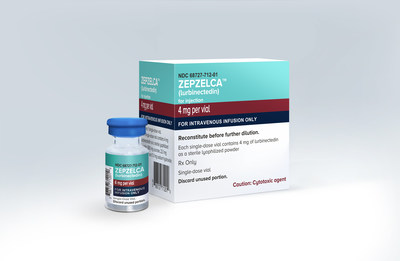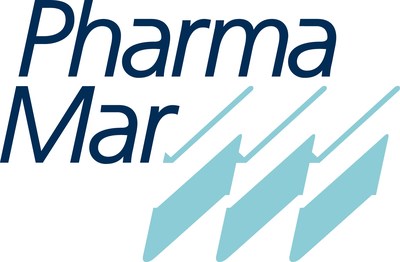Jazz Pharmaceuticals Announces U.S. FDA Accelerated Approval of Zepzelca™ (lurbinectedin) for the Treatment of Metastatic Small Cell Lung Cancer
The FDA approval of Zepzelca is based on monotherapy clinical data from an open-label, multi-center, single-arm study in 105 adult platinum-sensitive and platinum-resistant patients with SCLC who had disease progression after treatment with platinum-based chemotherapy.2 The data, which appeared in The Lancet Oncology
"Small cell lung cancer is a disease with limited treatment options, and the approval of Zepzelca represents an important advance for patients whose metastatic SCLC has progressed on or after platinum-based therapy," said
Zepzelca will be commercially available in the
"Seeing first-hand the aggressive nature of SCLC and knowing that the large majority of those diagnosed will experience relapse, I am excited to see an effective new treatment demonstrating durable responses," said Dr.
"We are pleased to bring a new treatment choice to relapsed SCLC patients," said José María Fernández Sousa-Faro, PhD, president of
Zepzelca is administered by an intravenous (IV) infusion delivering a 3.2 mg/m2 dose over the course of one hour, repeated every 21 days until disease progression or unacceptable toxicity.1 Zepzelca can be administered in an outpatient clinic and its dosing schedule of a single infusion every 21 days may result in less time a patient receives treatment in the clinic or hospital compared to other options.
The most common adverse reactions (≥20%), including laboratory abnormalities, are leukopenia, lymphopenia, fatigue, anemia, neutropenia, increased creatinine, increased alanine aminotransferase, increased glucose, thrombocytopenia, nausea, decreased appetite, musculoskeletal pain, decreased albumin, constipation, dyspnea, decreased sodium, increased aspartate aminotransferase, vomiting, cough, decreased magnesium and diarrhea.1
"In addition to the physical toll it takes on patients, a relapse of SCLC also takes a mental and emotional toll on the entire family," said
About the Phase 2 Monotherapy Trial
The Phase 2 trial of Zepzelca was an open-label, single-arm study, which enrolled a total of 105 SCLC patients at 26 hospitals in six European countries and the
Investor Webcast on
The company will host a webcast on
A live webcast of the presentation may be accessed from the Investors section of the
More information about Zepzelca, including Full Prescribing Information and Patient Information, is available here. < http://pp.jazzpharma.com/pi/zepzelca.en.USPI.pdf >
About Zepzelca™ (lurbinectedin)
Zepzelca, also known as PM1183, is an alkylating drug that binds guanine residues within DNA. This triggers a cascade of events that can affect the activity of DNA binding proteins, including some transcription factors, and DNA repair pathways, resulting in disruption of the cell cycle and eventual cell death.1
Zepzelca for injection 4 mg is a prescription medicine used to treat adults with a kind of lung cancer called small cell lung cancer (SCLC) that has spread to other parts of the body (metastatic) and who have received treatment with chemotherapy that contains platinum, and it did not work or is no longer working. Zepzelca is approved based on response rate and how long the response lasted. Additional studies will further evaluate the benefit of Zepzelca for this use.
Important Safety Information
Before receiving ZEPZELCA, tell your healthcare provider about all of your medical conditions, including if you:
- have liver or kidney problems.
- are pregnant or plan to become pregnant. ZEPZELCA can harm your unborn baby.
Females who are able to become pregnant: - Your healthcare provider should do a pregnancy test before you start treatment with ZEPZELCA.
- You should use effective birth control (contraception) during treatment with and for 6 months after your final dose of ZEPZELCA.
- Tell your healthcare provider right away if you become pregnant or think that you are pregnant during treatment with ZEPZELCA.
Males with female partners who are able to become pregnant should use effective birth control during treatment with and for 4 months after your final dose of ZEPZELCA.
- are breastfeeding or plan to breastfeed. It is not known if ZEPZELCA passes into your breastmilk. Do not breastfeed during treatment with ZEPZELCA and for 2 weeks after your final dose of ZEPZELCA. Talk to your healthcare provider about the best way to feed your baby during treatment with ZEPZELCA.
Tell your healthcare provider about all the medicines you take, including prescription and over-the-counter medicines, vitamins, and herbal supplements. Certain other medicines may affect how ZEPZELCA works.
What should I avoid while using ZEPZELCA?
Avoid eating or drinking grapefruit, or products that contain grapefruit juice during treatment with ZEPZELCA.
ZEPZELCA can cause serious side effects, including:
- Low blood cell counts. Low blood counts including low neutrophil counts (neutropenia) and low platelet counts (thrombocytopenia) are common with ZEPZELCA, and can also be severe. Some people with low white blood cell counts may get fever, or an infection throughout the body (sepsis), that can cause death. Your healthcare provider should do blood tests before you receive each treatment with ZEPZELCA to check your blood cell counts.
Tell your healthcare provider right away if you develop: - fever or any other signs of infection
- unusual bruising or bleeding
- tiredness
- pale colored skin
- Liver problems. Increased liver function tests are common with ZEPZELCA, and can also be severe. Your healthcare provider should do blood tests to check your liver function before you start and during treatment with ZEPZELCA.
Tell your healthcare provider right away if you develop symptoms of liver problems including: - loss of appetite
- nausea or vomiting
- pain on the right side of your stomach area (abdomen)
Your healthcare provider may temporarily stop treatment, lower your dose, or permanently stop ZEPZELCA if you develop low blood cell counts or liver problems during treatment with ZEPZELCA.
The most common side effects of ZEPZELCA include:
- tiredness
- low white and red blood cell counts
- increased kidney function blood test (creatinine)
- increased liver function blood tests
- increased blood sugar (glucose)
- nausea
- decreased appetite
- muscle and joint (musculoskeletal) pain
- low level of albumin in the blood
- constipation
- trouble breathing
- low levels of sodium and magnesium in the blood
- vomiting
- cough
- diarrhea
These are not all of the possible side effects of ZEPZELCA.
Call your doctor for medical advice about side effects. You are encouraged to report negative side effects of prescription drugs to the FDA. Visit www.fda.gov/medwatch or call 1-800-FDA-1088. You may also report side effects to
About
Headquartered in
About
Jazz Pharmaceuticals "Safe Harbor" Statement under the Private Securities Litigation Reform Act of 1995
This press release contains forward-looking statements, including, but not limited to, statements related to
References:
- ZEPZELCA (lurbinectedin) Prescribing Information.
Palo Alto, CA :Jazz Pharmaceuticals, Inc. - Trigo J, Subbiah V, Besse B, et al. Lurbinectedin as second-line treatment for patients with small-cell lung cancer: a single-arm, open-label, phase 2 basket trial. Lancet Oncol. 2020 May;21(5):645–654.
Jazz Pharmaceuticals Media and Investor Relations Contact
Media Contact:
Investor Contact:
![]() View original content to download multimedia:http://www.prnewswire.com/news-releases/jazz-pharmaceuticals-announces-us-fda-accelerated-approval-of-zepzelca-lurbinectedin-for-the-treatment-of-metastatic-small-cell-lung-cancer-301077082.html
View original content to download multimedia:http://www.prnewswire.com/news-releases/jazz-pharmaceuticals-announces-us-fda-accelerated-approval-of-zepzelca-lurbinectedin-for-the-treatment-of-metastatic-small-cell-lung-cancer-301077082.html
SOURCE



